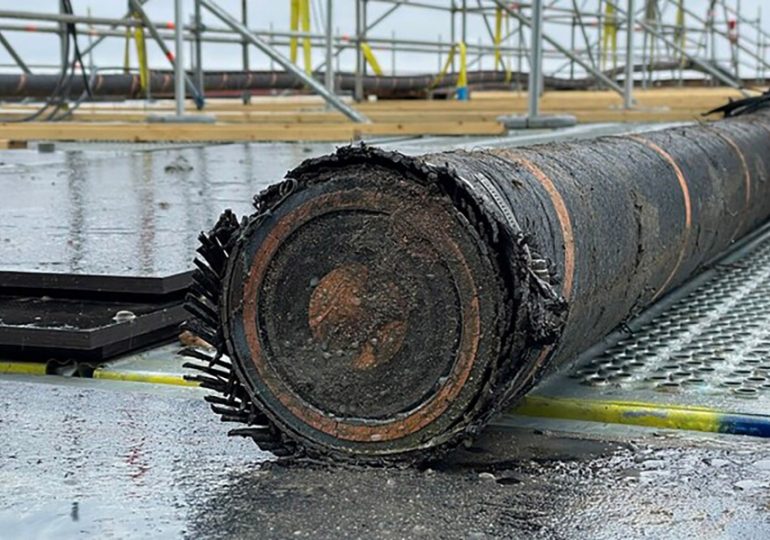A RUSSIAN oil tanker is reportedly being investigated for potential sabotage after another underwater cable was damaged in the Baltic Sea.
Finnish authorities are probing Eagle S vessel from the Russian “shadow fleet” after the Estlink 2 subsea electricity cable went off on Christmas day.
East2WestThe EstLink 2 power cable[/caption]
East2WestEagle S crude oil tanker sailing under the flag of the Cook Islands was seen passing over the cable[/caption]
GettyRussia could be behind the suspected sabotage attack[/caption]
The incident cut off the electricity connection between Finland and Estonia on Christmas Day.
With a transmission capacity is over 650 megawatts, the 170-kilometre-long cable is an important electricity transmission link for Finland and the Baltics.
And it could take a few months to repair the damage to the cable that was installed nearly a decade ago.
It’s the latest in a series of incidents in the region in which undersea cables appear to have been damaged.
Authorities are investigating if it was an act of sabotage by the Russians as the Eagle S was seen passing over the cable at the time of the incident, the Financial Times reports.
Police have reportedly boarded the tanker as part of their investigation.
Some reports say the Eagle S slowed down to a quarter of its speed a few minutes before it crossed Estlink 2.
Meanwhile, a Hong Kong-registered tanker called Xin Xin Tian 2 also reportedly passed over the cable around the time the Estlink 2 outage occurred.
It is owned by logistics company Hainan Yangpu, part of the Torgmol group, which has close ties to Russia.
Finnish transmission system operator Fingrid representative Arto Pahkin said intentional malicious action has not been ruled out.
He said: “The possibility of vandalism cannot be ruled out. However, we are currently studying the situation as a whole and will inform you of the cause of the malfunction as soon as we know it.”
The Christmas Day incident appears to be the latest in a series of pipelines and cables being targeted in the Baltic Sea by foreign vessels.
Suspicions have focused on Chinese-linked vessels and an alleged hybrid war by Russia over several incidents involving Baltic undersea cables.
It has now sparked fears of deliberate attacks on critical infrastructure between Nato countries.
Two data cables, one running between Finland and Germany, and the other between Lithuania and Sweden, were severed in November.
The 1,200km cable from Finland to Germany stopped working on Monday – less than a day after the 218 km long cable between Lithuania and Sweden’s Gotland Island went out of service.
The cable cutting happened in the same waterway where authorities previously probed potentially malicious incidents – including damage to a gas pipeline last year.
Finland and Germany said they were “deeply concerned about the severed undersea cable”.
The two countries added they were investigating “an incident [that] immediately raises suspicions of intentional damage”.
Authorities in Helsinki and Berlin also said Europe’s security is threatened by Russia’s war in Ukraine and “hybrid warfare by malicious actors”.
Last year a subsea gas pipeline and several telecoms cables running along the bottom of the Baltic Sea were severely damaged in an incident raising alarm bells in the region.
Investigators of the 2023 cases in Finland and Estonia named a Chinese container ship that they believe dragged its anchor and caused the damage.
But they have not said whether the damage was accidental or intentional.
In 2022 the Nord Stream gas pipelines linking Russia to Germany in the Baltic Sea were destroyed by explosions in a case that remains under investigation by German authorities.
Tapio Frantti, a cybersecurity professor at the University of Jyväskylä, says the cable rupture between Finland and Germany was most likely purposeful rather than accidental – and that Russia could have enough motives for a planned disruption.
He told YLE: “If you look at this from the point of view of probability, then yes, this is on the side of intentionality.
“When a cable breaks, it raises questions as to why it happened [and] who might have a motive to do something like this.
“They [Russia] really seem to think that they have a special right to do such things. The motive for sabotage is usually that it’s done because it can be done.”
Frantti added that, while the implications of a single cable break are minor, it would be concerning if the act was found to be intentional.
He continued: “It comes to mind that this could be a practice for a larger-scale act if there is a need for that.”
The cable issues comes just days after a Russian spy ship was caught lurking off the UK coast near pipelines and internet cables.
Leave a comment








